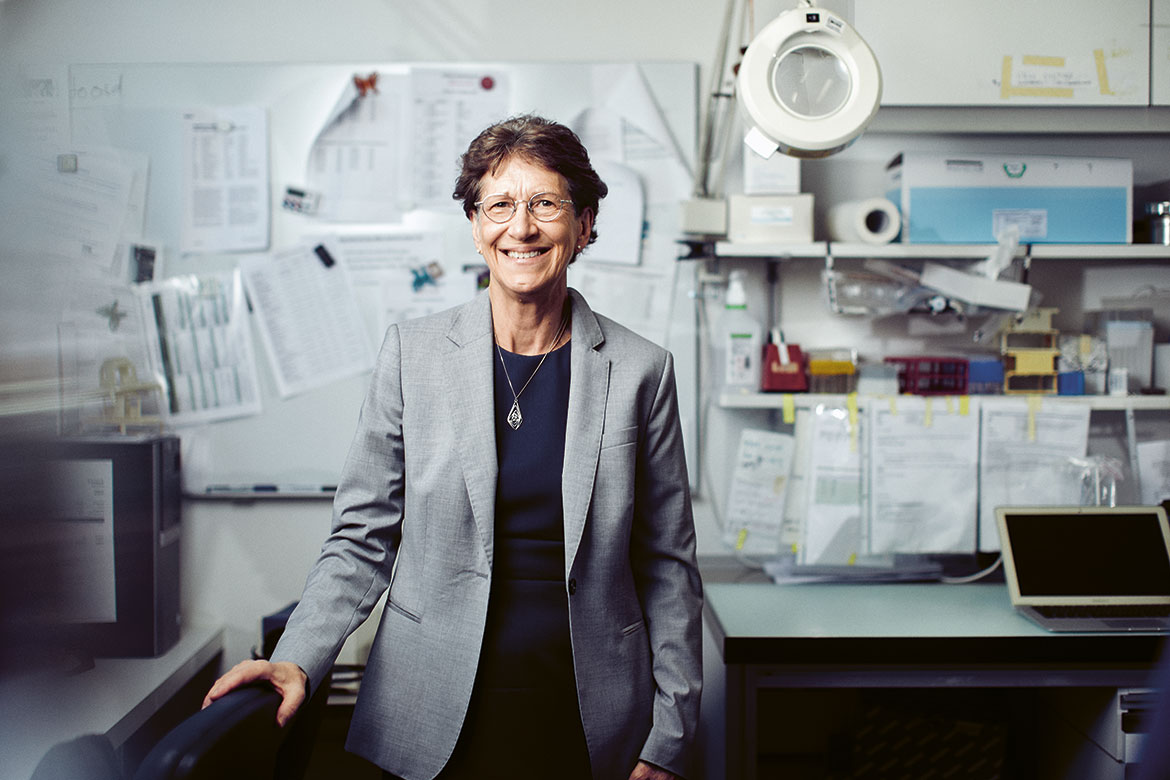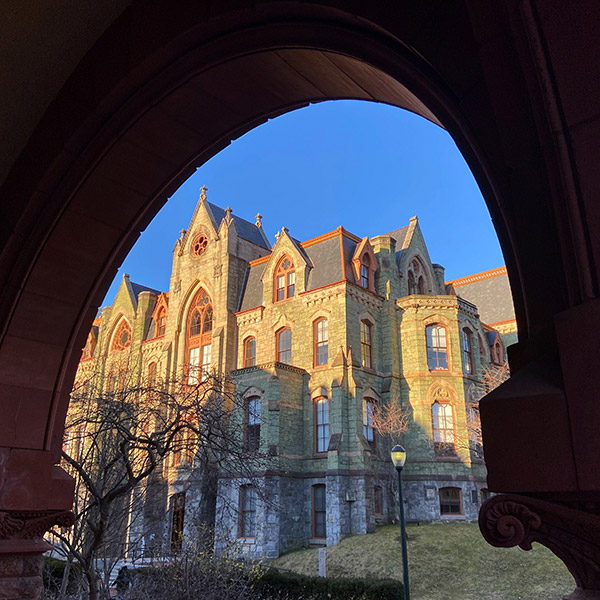PORTRAIT
Susan Gasser, optimist emeritus
The biologist Susan Gasser researches into the memories of cells. And she also encourages young mothers to embark on an academic career. She recently retired, but still has many plans.

“In research, you do a lot of things wrong before something goes right”. The renowned epigeneticist Susan Gasser is still searching for what has always remained undiscovered. | Image: Lucia Hunziker
The lockdown left Susan Gasser quite unscathed – on the contrary, she rather enjoyed it: “I didn’t have to travel as much and had a lot of time to read and write”, she says. “That was nice”. Her approach to the limitations imposed by the coronavirus is also indicative of the passion she harbours for her research.
You notice her enthusiasm as soon as she talks about her work. She is one of the world’s leading epigeneticists, and researches into what she calls the “memory of cells”: environmental factors such as stress or nourishment that are stored in the chromosomes by activating or deactivating certain genes. This can have an impact on ageing, for example, or on the development of illnesses. Epigenetics is a relatively young field of research. It can also provide information on how genetic characteristics that are acquired through environmental influences can also be passed on. In turn, these insights can help us to a better understanding of how cancer and other age-related illnesses develop, and can aid us in improving therapies for them.
Curiosity first
Gasser’s research into the organisation and transfer of genetic information has made an important contribution to cell biology and brought her many renowned prizes, including the National Latsis Prize, the Otto Naegeli Prize for medical research and the Inserm’s Prix International, which is awarded every year to exceptional international researchers.
But while she derives much pleasure from her work, Gasser insists the path to new knowledge is a hard and stony one. “As a researcher, you need a good deal of optimism and patience”, she says. Because experiments in the lab often just don’t work, or don’t provide the hoped-for results. “In research, you do a lot of things wrong before something goes right”. For Gasser, the energy needed for this perseverance is derived from her curiosity: “You have to want to find things that haven’t been discovered yet”.
Gasser’s urge to understand the world initially led her to study Ancient Greek philosophy at the University of Chicago in her native America. Later, she discovered her aptitude for the natural sciences and switched to mathematics, physics and biology.
Her love of her subject has been the driving force behind Gasser’s scientific career, and has remained with her to this day. In 1979 she came to Basel with her fiancé, who was Swiss, and took her doctorate under the biochemist Gottfried Schatz. Back then she had no idea that she would stay for so long. “We actually planned to return to the USA after finishing our doctorates”, she says. But her doctoral studies opened up further career prospects for her in Switzerland. She first moved to French-speaking Switzerland, where she worked at the Swiss Institute for Experimental Cancer Research and at the University of Geneva. Later, she moved back to Basel where for 15 years she ran the Friedrich Miescher Institute for Biomedical Research (FMI) that is funded by the pharmaceutical company Novartis, and also worked as a professor of molecular biology at the University of Basel.
The struggle for equality
Besides her research, Susan Gasser has also been active in promoting women in science. Academia in Switzerland remains a man’s world. The higher up you look in the university echelons, the lower the proportion of women. One of the reasons for this is the difficulty involved in coping with a career and a family at the same time – something that Gasser experienced herself, after giving birth to a son. “In Switzerland, it’s relatively difficult when you have a small child and both parents want to work”, she says. This is because childcare is poorly developed here, and expensive too. What’s more, the crucial moments in an academic career usually come at precisely the time in life when people are thinking of starting a family. “The university system forgets those people who don’t move quickly up the career ladder”. It was very difficult to continue with her scientific work in the 1980s when she also had to cope with being a mother. “Things have got better since then, but not enough”, says Gasser. “This is a structural problem that we can actually change”.
Whilst presiding over the Gender Equality Commission of the Swiss National Science Foundation, Gasser set up a funding instrument designed for exceptional women researchers that offered young women financial support and coaching in an endeavour to help them combine a family with a scientific career. Over the years, Gasser has always paid particular attention to helping young women researchers. “I have always appointed lots of women and encouraged them to pursue their scientific careers alongside having a family”.
No rest in retirement
Promoting women in science will remain of great concern to Gasser in the future. She would like to unite her interest in Japan with her commitment to gender equality, and is planning to organise conferences on epigenetics in Japan where the papers will be given exclusively by women.
Despite turning 65, Gasser still has major professional plans. She has continued running her research group at the Friedrich Miescher Institute, which uses threadworms to investigate influences on the organisation of cell nuclei. She is also a member of the Board of the Swiss Federal Institutes of Technology (ETH Board) that is appointed by the Federal Council. This is the strategic executive body of the Institutes, and Gasser wants to use her position there to get certain things done. “Science should contribute to solving the big societal problems of our time”, she says. To Gasser, these problems include the climate crisis, diminishing biodiversity and forest dieback. “The Institutes of Technology are excellent, but they could be achieving more important, more practical goals in these areas. This is what I’m campaigning for”.
In this context, Gasser also insists: “I can’t imagine going into retirement”. It is unthinkable to her, not least because she has rarely seen her scientific activities as ‘work’. “Science is my passion, and if you devote yourself to your passion, it isn’t work”.




